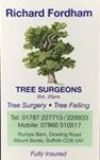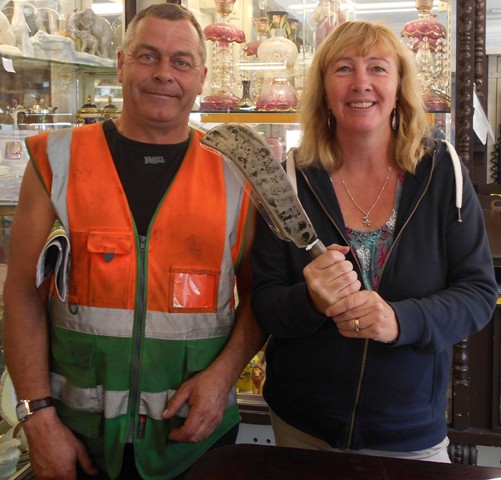There is no limit to the extraordinary people who come to Hungerford Arcade. Richard Fordham is a prime example. He told us that the company he owns is a well established company and have been in business for over 25 years. The company is based on the border’s of Suffolk & Essex in the villa ge of Mount Bures. He said, “We have an excellent record & high standard of services and approach from our respectful & dedicated team.
ge of Mount Bures. He said, “We have an excellent record & high standard of services and approach from our respectful & dedicated team.
We offer a wide range of professional service’s which are carried out all over the UK, from tree surgery to the harvesting and felling of cricket bat willow’s for one of the largest companies throughout the world, J.S Wright & Sons Ltd (Cricket Bat Manufacturer’s) Great Leighs, Chelmsford, Essex”.
Read the early history of the Wright & Sons’ Company below. It is fascinating.
History Pre 1963
Early History of the Company

Photo © 1955. Jessie Wright is on the left
Born in 1874, Jessie Samuel Wright lived at Warren Park in Little Leighs where he ran a building company.
On occasions he would meet a gentleman named Mr. Odd. Mr. Odd asked Jessie if he knew of any willow trees in his area, by his own admission Jessie’s knowledge of willow trees was limited. However Mr.Odd asked him to look out for any and let him know when he found some, he would then inspect them to see if they were the right variety. Once Jessie knew what to look for he decided it would be more lucrative than the building industry, so he bought The Willows in Little Leighs and named the company J. S. Wright in 1894.
This man was almost certainly Montague Odd, who made cricket bats, and in particular, he made bats for W G Grace at a guinea each.
His father (Amos Odd) had a cricket bat manufacturing business and sports shop in Croydon which Montague inherited. It was Amos who perfected and patented the cricket bat from its original crude form to that which we know today.
Jessie married Annie Mansfield, they had five children; Grace, Bessie, Stanley, Albert and Doris. Annie died very young and Jessie then married Kate Cranfield (c.1910) and they had two more children; Laura and Carleton.

This photo shows Carleton Wright riding on the trailer with George Herbert Driving © 1929
As regards the Willow business, Jessie would do all the carting of trees and delivering of clefts to Rayne railway station, among other places, using a horse and cart. In those days the clefts were split from the rolls and left to stand for eighteen months before being sold air dried, no circular saws were used to shape the cleft.
Stanley, Albert and Carleton were involved from a very early age. During the first world war Jessie did not go to war but was in the Special Constabulary, therefore the business was able to continue. Occassionally soldiers would march from Colchester Barracks to Warley Barracks and would stop in the village for their lunch, the officers would come into The Willows and have lunch with Jessie.
Around 1922 Princess Marie Louise visited the company and took time to look at the process and inspect the clefts. She arrived by horse and coach, much to the delight of the local children.
It was now the second world war, only Carleton was called up for service, he was first stationed at Littlehampton and eventually travelled to many countries.

L to R: Stan, Jessie, Albert and Carleton
Stanley and Albert were in the Special Constabulary, so, as in the first world war, the company was able to tick over. The site was nearly destroyed, when a German bomb landed in the field at the back of the yard.
Jessie died in 1963 aged 88.
The family are still very much involved in the business. The business is run by the Chairman Nicholas Wright (Jessie’s Grandson) who has recently been awarded an MBE for Services to Industry, Jeremy Ruggles (Jessie’s Great Grandson) and Oliver Wright ( Nick’s son and Jessie’s Great Grand Son). The Company now produces more cricket bat blades than ever.
You can read more of this company’s amazing history by clicking on this link to their website at http://www.cricketbatwillow.com/

